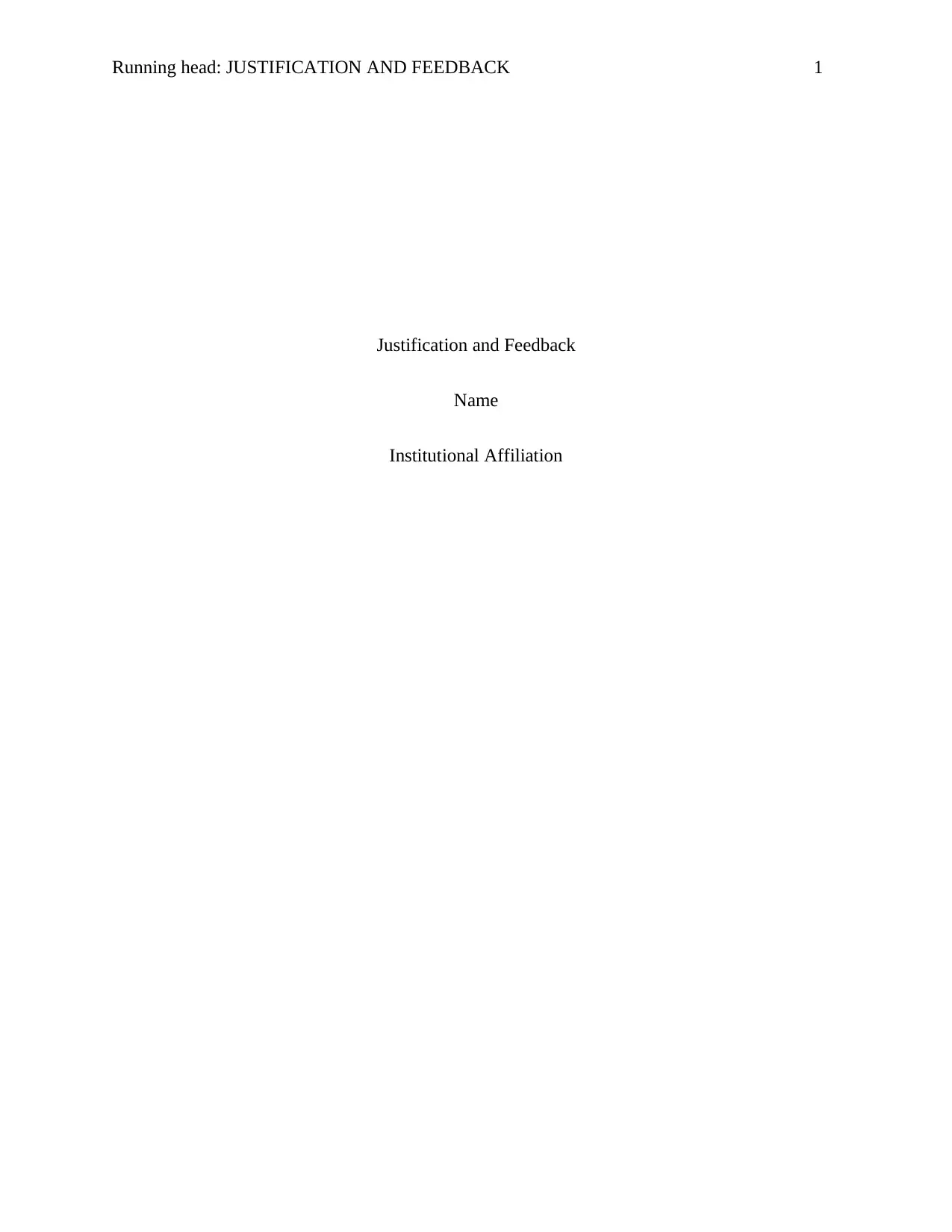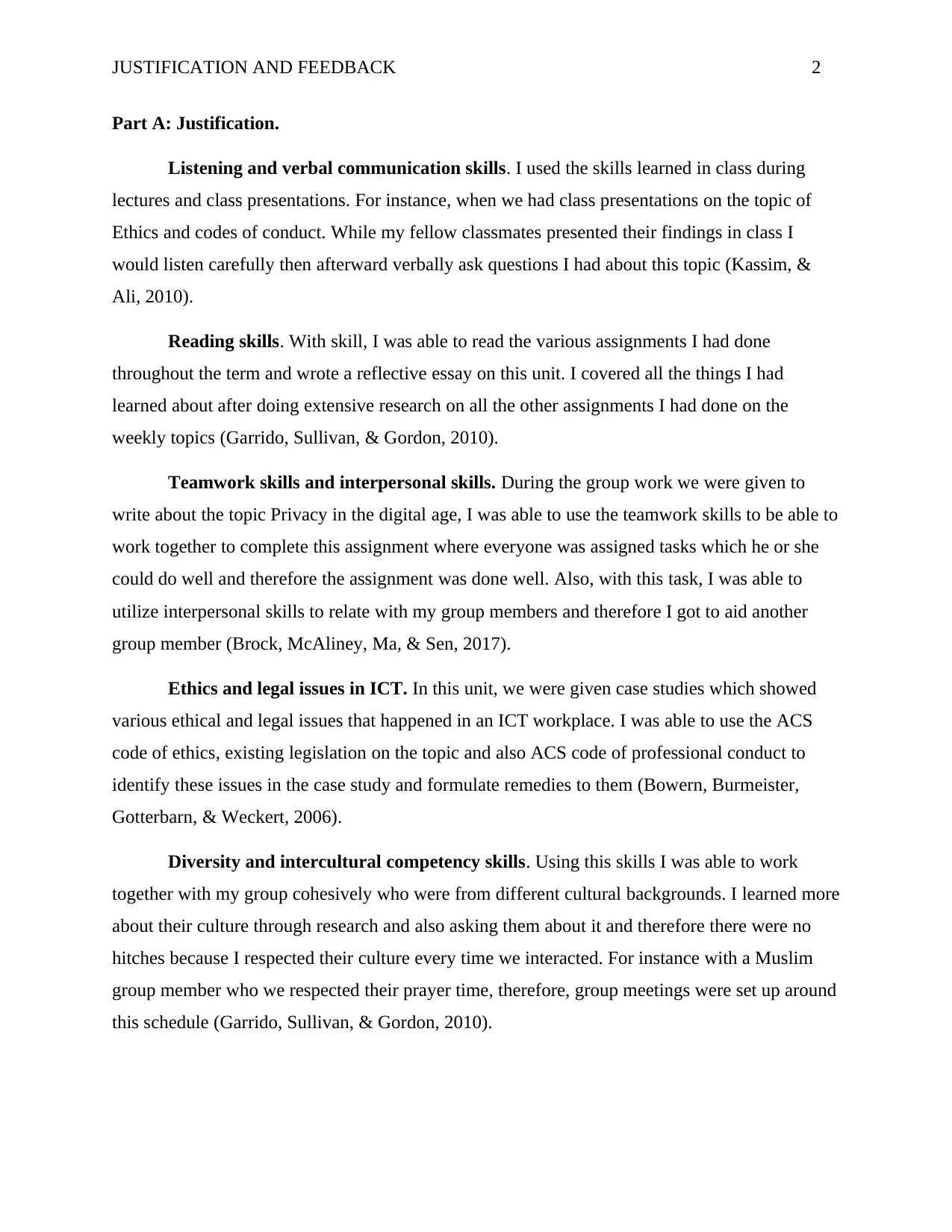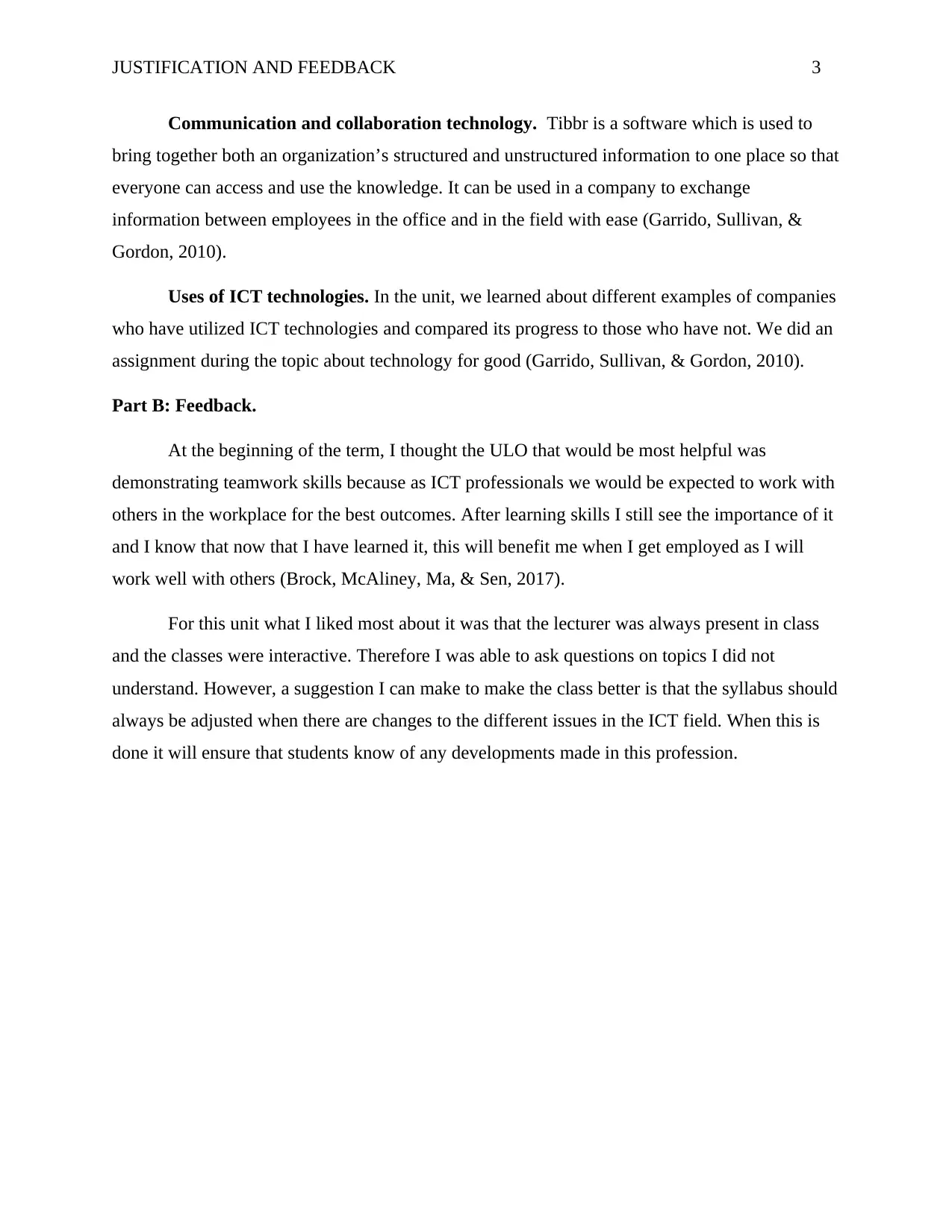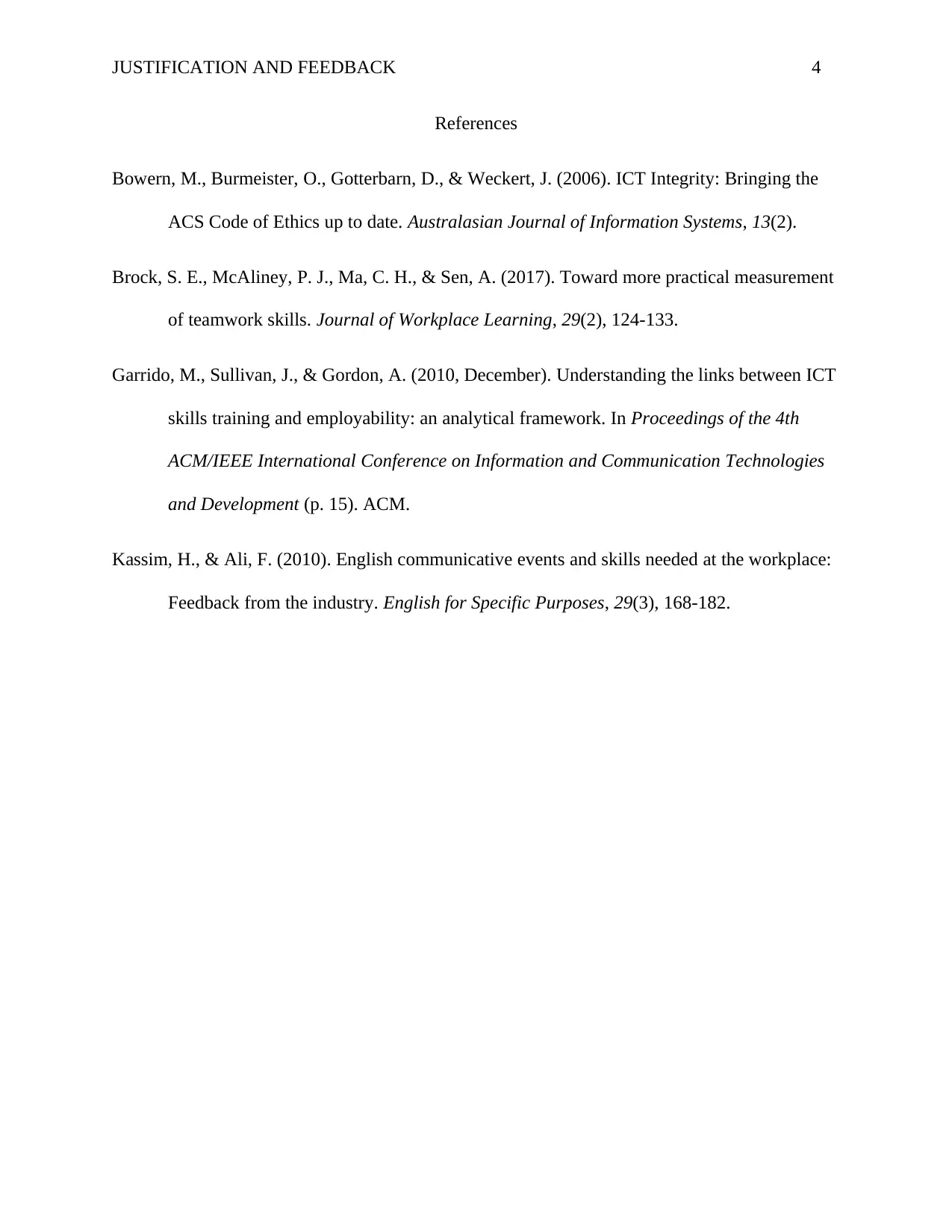COIT20249 Portfolio: Reflective Justification and Feedback Essay
VerifiedAdded on 2023/06/11
|4
|926
|228
Portfolio
AI Summary
This portfolio provides a justification and feedback analysis related to skills acquired in an ICT course. The student reflects on listening, verbal communication, reading, teamwork, interpersonal skills, and ethical considerations within the ICT field. They discuss the application of these skills in assignments, including case studies on ethical and legal issues and group work on privacy in the digital age. The portfolio also covers the use of communication and collaboration technologies like Tibbr and the impact of ICT technologies on businesses. Feedback on the unit highlights the importance of teamwork skills and suggests syllabus adjustments to reflect current developments in the ICT field. Desklib offers this portfolio along with a wealth of other student-contributed assignments and resources.

Running head: JUSTIFICATION AND FEEDBACK 1
Justification and Feedback
Name
Institutional Affiliation
Justification and Feedback
Name
Institutional Affiliation
Paraphrase This Document
Need a fresh take? Get an instant paraphrase of this document with our AI Paraphraser

JUSTIFICATION AND FEEDBACK 2
Part A: Justification.
Listening and verbal communication skills. I used the skills learned in class during
lectures and class presentations. For instance, when we had class presentations on the topic of
Ethics and codes of conduct. While my fellow classmates presented their findings in class I
would listen carefully then afterward verbally ask questions I had about this topic (Kassim, &
Ali, 2010).
Reading skills. With skill, I was able to read the various assignments I had done
throughout the term and wrote a reflective essay on this unit. I covered all the things I had
learned about after doing extensive research on all the other assignments I had done on the
weekly topics (Garrido, Sullivan, & Gordon, 2010).
Teamwork skills and interpersonal skills. During the group work we were given to
write about the topic Privacy in the digital age, I was able to use the teamwork skills to be able to
work together to complete this assignment where everyone was assigned tasks which he or she
could do well and therefore the assignment was done well. Also, with this task, I was able to
utilize interpersonal skills to relate with my group members and therefore I got to aid another
group member (Brock, McAliney, Ma, & Sen, 2017).
Ethics and legal issues in ICT. In this unit, we were given case studies which showed
various ethical and legal issues that happened in an ICT workplace. I was able to use the ACS
code of ethics, existing legislation on the topic and also ACS code of professional conduct to
identify these issues in the case study and formulate remedies to them (Bowern, Burmeister,
Gotterbarn, & Weckert, 2006).
Diversity and intercultural competency skills. Using this skills I was able to work
together with my group cohesively who were from different cultural backgrounds. I learned more
about their culture through research and also asking them about it and therefore there were no
hitches because I respected their culture every time we interacted. For instance with a Muslim
group member who we respected their prayer time, therefore, group meetings were set up around
this schedule (Garrido, Sullivan, & Gordon, 2010).
Part A: Justification.
Listening and verbal communication skills. I used the skills learned in class during
lectures and class presentations. For instance, when we had class presentations on the topic of
Ethics and codes of conduct. While my fellow classmates presented their findings in class I
would listen carefully then afterward verbally ask questions I had about this topic (Kassim, &
Ali, 2010).
Reading skills. With skill, I was able to read the various assignments I had done
throughout the term and wrote a reflective essay on this unit. I covered all the things I had
learned about after doing extensive research on all the other assignments I had done on the
weekly topics (Garrido, Sullivan, & Gordon, 2010).
Teamwork skills and interpersonal skills. During the group work we were given to
write about the topic Privacy in the digital age, I was able to use the teamwork skills to be able to
work together to complete this assignment where everyone was assigned tasks which he or she
could do well and therefore the assignment was done well. Also, with this task, I was able to
utilize interpersonal skills to relate with my group members and therefore I got to aid another
group member (Brock, McAliney, Ma, & Sen, 2017).
Ethics and legal issues in ICT. In this unit, we were given case studies which showed
various ethical and legal issues that happened in an ICT workplace. I was able to use the ACS
code of ethics, existing legislation on the topic and also ACS code of professional conduct to
identify these issues in the case study and formulate remedies to them (Bowern, Burmeister,
Gotterbarn, & Weckert, 2006).
Diversity and intercultural competency skills. Using this skills I was able to work
together with my group cohesively who were from different cultural backgrounds. I learned more
about their culture through research and also asking them about it and therefore there were no
hitches because I respected their culture every time we interacted. For instance with a Muslim
group member who we respected their prayer time, therefore, group meetings were set up around
this schedule (Garrido, Sullivan, & Gordon, 2010).

JUSTIFICATION AND FEEDBACK 3
Communication and collaboration technology. Tibbr is a software which is used to
bring together both an organization’s structured and unstructured information to one place so that
everyone can access and use the knowledge. It can be used in a company to exchange
information between employees in the office and in the field with ease (Garrido, Sullivan, &
Gordon, 2010).
Uses of ICT technologies. In the unit, we learned about different examples of companies
who have utilized ICT technologies and compared its progress to those who have not. We did an
assignment during the topic about technology for good (Garrido, Sullivan, & Gordon, 2010).
Part B: Feedback.
At the beginning of the term, I thought the ULO that would be most helpful was
demonstrating teamwork skills because as ICT professionals we would be expected to work with
others in the workplace for the best outcomes. After learning skills I still see the importance of it
and I know that now that I have learned it, this will benefit me when I get employed as I will
work well with others (Brock, McAliney, Ma, & Sen, 2017).
For this unit what I liked most about it was that the lecturer was always present in class
and the classes were interactive. Therefore I was able to ask questions on topics I did not
understand. However, a suggestion I can make to make the class better is that the syllabus should
always be adjusted when there are changes to the different issues in the ICT field. When this is
done it will ensure that students know of any developments made in this profession.
Communication and collaboration technology. Tibbr is a software which is used to
bring together both an organization’s structured and unstructured information to one place so that
everyone can access and use the knowledge. It can be used in a company to exchange
information between employees in the office and in the field with ease (Garrido, Sullivan, &
Gordon, 2010).
Uses of ICT technologies. In the unit, we learned about different examples of companies
who have utilized ICT technologies and compared its progress to those who have not. We did an
assignment during the topic about technology for good (Garrido, Sullivan, & Gordon, 2010).
Part B: Feedback.
At the beginning of the term, I thought the ULO that would be most helpful was
demonstrating teamwork skills because as ICT professionals we would be expected to work with
others in the workplace for the best outcomes. After learning skills I still see the importance of it
and I know that now that I have learned it, this will benefit me when I get employed as I will
work well with others (Brock, McAliney, Ma, & Sen, 2017).
For this unit what I liked most about it was that the lecturer was always present in class
and the classes were interactive. Therefore I was able to ask questions on topics I did not
understand. However, a suggestion I can make to make the class better is that the syllabus should
always be adjusted when there are changes to the different issues in the ICT field. When this is
done it will ensure that students know of any developments made in this profession.
⊘ This is a preview!⊘
Do you want full access?
Subscribe today to unlock all pages.

Trusted by 1+ million students worldwide

JUSTIFICATION AND FEEDBACK 4
References
Bowern, M., Burmeister, O., Gotterbarn, D., & Weckert, J. (2006). ICT Integrity: Bringing the
ACS Code of Ethics up to date. Australasian Journal of Information Systems, 13(2).
Brock, S. E., McAliney, P. J., Ma, C. H., & Sen, A. (2017). Toward more practical measurement
of teamwork skills. Journal of Workplace Learning, 29(2), 124-133.
Garrido, M., Sullivan, J., & Gordon, A. (2010, December). Understanding the links between ICT
skills training and employability: an analytical framework. In Proceedings of the 4th
ACM/IEEE International Conference on Information and Communication Technologies
and Development (p. 15). ACM.
Kassim, H., & Ali, F. (2010). English communicative events and skills needed at the workplace:
Feedback from the industry. English for Specific Purposes, 29(3), 168-182.
References
Bowern, M., Burmeister, O., Gotterbarn, D., & Weckert, J. (2006). ICT Integrity: Bringing the
ACS Code of Ethics up to date. Australasian Journal of Information Systems, 13(2).
Brock, S. E., McAliney, P. J., Ma, C. H., & Sen, A. (2017). Toward more practical measurement
of teamwork skills. Journal of Workplace Learning, 29(2), 124-133.
Garrido, M., Sullivan, J., & Gordon, A. (2010, December). Understanding the links between ICT
skills training and employability: an analytical framework. In Proceedings of the 4th
ACM/IEEE International Conference on Information and Communication Technologies
and Development (p. 15). ACM.
Kassim, H., & Ali, F. (2010). English communicative events and skills needed at the workplace:
Feedback from the industry. English for Specific Purposes, 29(3), 168-182.
1 out of 4
Related Documents
Your All-in-One AI-Powered Toolkit for Academic Success.
+13062052269
info@desklib.com
Available 24*7 on WhatsApp / Email
![[object Object]](/_next/static/media/star-bottom.7253800d.svg)
Unlock your academic potential
Copyright © 2020–2026 A2Z Services. All Rights Reserved. Developed and managed by ZUCOL.





